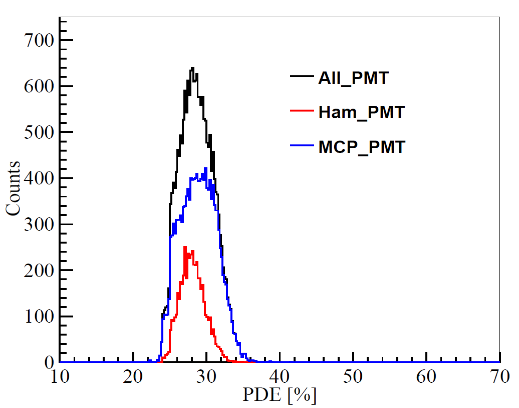IHEP in China, and CU, SUT and NARIT in Thailand Sign a Memorandum of Understanding for Scientific Collaboration
At a ceremony today at Beijing, the Institute of High Energy Physics, Chinese Academy of Sciences (IHEP), Chulalongkorn University (CU), Suranaree University of Technology (SUT) and National Astronomical Research Institute of Thailand (NARIT) announced the signing of a Memorandum of Understanding to establish scientific exchange and collaboration between the four organisations.
This agreement will see scientists share their expertise and collaborate on a number of activities for mutually beneficial outcomes.
Her Royal Highness Princess Maha Chakri Sirindhorn presided over the ceremony.
IHEP Director Prof Yifang Wang said this formalisation of a partnership with the Thai organisations was a great step for IHEP. Wang added: “We share a great many research interests and I look forward to the successful collaboration with our colleagues.”
“We believe that the future of High Energy Physics is shifting from Europe to Asia and it is unquestionable that IHEP is among the most influential leaders in this field. The collaboration between IHEP and the 3 Thai institutes will definitely promote one of the University's missions in producing local and international academic research. This is in good accordance with according to the vision of CU as a world-class national university that generates the knowledge and innovation necessary for the creative and sustainable transformation of Thai society. ” addressed CU President Prof. Bundhit Eua-arporn.
SUT Rector Prof. Prasart Suebka commented that “the collaboration between IHEP and SUT has been committed in the past 15 years, jointly organizing conferences and summer schools, carrying out common research projects, and exchanging researchers and students. I myself has visited IHEP three times, as Dean of Science and Rector of SUT. However, this is the first time IHEP and SUT officially sign an agreement. I do believe that the signing of the IHEP-SUT-CU-NARIT MoU will strengthen and extend our collaborations further among all parties. ”
“We are honoured and excited to enter into the collaborations between IHEP and Thai institutes. We look forwards to working with our colleagues to strengthen our research capability and human resource development in High energy and particle astrophysics. This MoU signing is a significant occasion to officially mark the existing collaborative links among our institutes. ” stated NARIT Executive Director Prof. Boonrucksar Soonthornthum.
IHEP is China’s premier research institute in particle physics, astroparticle physics and accelerator science. It manages a number of China’s large scientific facilities, including the Beijing Electron Positron Collider (BEPC), Dayabay Neutrino Experiments, Jiangmen Underground Neutrino Observatory (JUNO) and the Large High Altitude Air Shower Observatory (LHAASO).
CU is Thailand’s first institution of higher learning and was officially established in 1917. At present, there are 19 faculties with 16 colleges and institutes serving the foundations for modern education in Thailand. Chulalongkorn University has upheld its reputation as an institution for academic excellence, where a century of honourable tradition is perfectly combined with modern fields of study keeping on producing highly qualified graduates to serve Thai and international societies. The university is ranked 252 among the world’s top 2,000 universities in the Quacquarelli Symonds (QS) World Rankings for 2016-2017. CU is a member of JUNO, CMS and WLCG.
SUT is established in 1990 as the first public autonomous university in Thailand under the supervision of the Royal Thai Government. In 2016, at her young age of 26, SUT was ranked by Times Higher Education (THE) the 5th in Thailand, the 10th in ASEAN, and in 161st-170th in Asia. SUT plays an important role in the education and research in Nuclear and High Energy Physics in Thailand. SUT is a member of JUNO, ALICE, PANDA as well as PandaX.
NARIT is found in 2009 directly under the Ministry of Science and Technology, the Royal Thai Government. The institute is relatively young but has already established many successful national and international facilities for astronomy and astrophysics research as well as for public outreach and education activities. The institute was responsible for setting up and is managing the Thai National Observatory equipped with the 2.4-m aperture telescope, the largest optical telescope in South East Asia region. It is striving for excellence and to become one of a world-class organization for research and education in astronomy, astrophysics, high energy astrophysics and cosmology. NARIT is a member of JUNO, CTA and GOTO experiments.
Contact Information
Mr.Guo Lijun
ljguo@ihep.ac.cn

